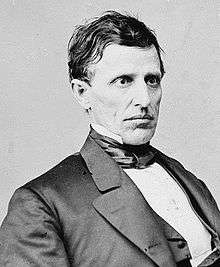Wells A. Hutchins
| Wells A. Hutchins | |
|---|---|
 | |
| Member of the U.S. House of Representatives from Ohio's 11th district | |
|
In office March 4, 1863 – March 3, 1865 | |
| Preceded by | Valentine B. Horton |
| Succeeded by | Hezekiah S. Bundy |
| Member of the Ohio House of Representatives from the Scioto County district | |
|
In office January 5, 1852 – January 1, 1854 | |
| Preceded by | Oscar F. Moore |
| Succeeded by | Samuel J. Huston |
| Personal details | |
| Born |
Wells Andrews Hutchins October 8, 1818 Hartford, Ohio |
| Died |
January 25, 1895 (aged 76) Portsmouth, Ohio |
| Resting place | Greenlawn Cemetery, Portsmouth |
| Political party |
Whig Democratic |
| Spouse(s) | Cornelia Robinson |
Wells Andrews Hutchins (October 8, 1818 – January 25, 1895) was a U.S. Representative from Ohio during the American Civil War.
Life and career
Born in Hartford, Ohio, Hutchins was a first cousin to future congressman John Hutchins. He attended the public schools and then taught school. He later studied law and was admitted to the bar in 1841. He commenced practice in Warren, Ohio.
In 1842, Hutchins moved to Portsmouth, Ohio, where he served as a member of the State house of representatives in 1852 and 1853. He was a Whig while in Portsmouth.[1] He was the city solicitor from 1857-61. He was an unsuccessful candidate in 1860 to the Thirty-seventh Congress. During the early part of the Civil War, he was the United States provost marshal for the state of Ohio in 1862.
Hutchins was elected as a Democrat to the Thirty-eighth Congress (March 4, 1863 – March 3, 1865). A War Democrat,[2] he supported Abraham Lincoln's agenda at critical moments. Hutchins called the proclamation Lincoln issued on September 15, 1863 under the authority of the Habeas Corpus Suspension Act of 1863 "necessary" in order to defeat the rebellion.[3] He was one of only 16 Democrats in the House of Representatives who joined with the Republicans and voted to ratify the Thirteenth Amendment to the United States Constitution on January 31, 1865. That amendment abolished slavery in the United States.[4] By doing so, he became one of a group who had "defied their party discipline, and had deliberately and with unfaltering faith marched to their political death",[5] according to abolitionist Congressman James Mitchell Ashley.
He was an unsuccessful candidate in 1864 for reelection to the Thirty-ninth Congress and again in 1880 to the Forty-seventh Congress.
Hutchins resumed the practice of law in Portsmouth and died there January 25, 1895. He was interred in Greenlawn Cemetery. He died of kidney disease.[1]
On February 23, 1843, Hutchins married Cornelia Robinson of Portsmouth.[1]
Legacy
He is portrayed by actor Walton Goggins in the 2012 film Lincoln.
Notes
- 1 2 3 Evans 1900 :314-316
- ↑ Evans 1900 : 298
- ↑ Trefousse, Hans Louis (2005). "First among equals": Abraham Lincoln's reputation during his administration. Fordham University Press. p. 53. ISBN 978-0-8232-2468-5.
- ↑ Williams, Frank J.; Holzer, Harold; Simon, John Y. (2007). Judging Lincoln. SIU Press. p. 138. ISBN 978-0-8093-2759-1.
- ↑ Ashley, James M. (April 1891). "The Passage of the Thirteenth Amendment to the Constitution". Magazine of Western History. XIII (6): 663–679.
References
- Evans, Nelson Wiley; Stivers, Emmons B (1900). A history of Adams County, Ohio: from its earliest settlement to the present time. West Union, Ohio: E B Stivers.
External links
- United States Congress. "Wells A. Hutchins (id: H001010)". Biographical Directory of the United States Congress. Retrieved on 2009-04-29
![]() This article incorporates public domain material from the Biographical Directory of the United States Congress website http://bioguide.congress.gov.
This article incorporates public domain material from the Biographical Directory of the United States Congress website http://bioguide.congress.gov.
| United States House of Representatives | ||
|---|---|---|
| Preceded by Valentine B. Horton |
Member of the U.S. House of Representatives from Ohio's 11th congressional district March 4, 1863 – March 3, 1865 |
Succeeded by Hezekiah S. Bundy |
